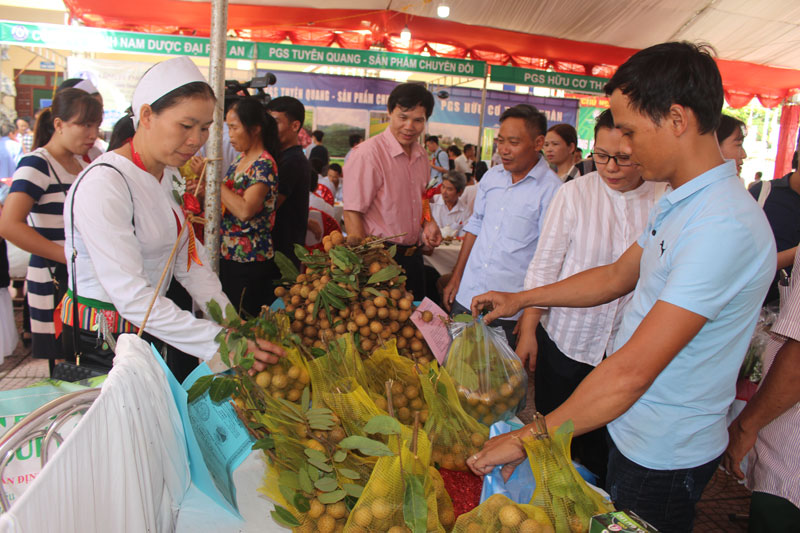
Mr. Nguyen Anh Duc, the Head of Luong Son Department of Agriculture and Rural Development says that Luong Son People's Committee has been determined to build the production chain towards good agricultural practices (VietGAP), ensuring food safety, with the non-business capital and production support capital under the Program of the New Rural Construction.
Specifically, Luong Son district has supported nearly 200 million VND for Vai Dao Cooperative of Agriculture and Trade Service to build VietGAP label chain. They have supported 99 million VND for Thuan Phat Cooperative of Agriculture and Service to build and certify the chicken chain under VietGAP standard. They have also supported 103 million VND for Tan Thanh cooperative to build and certify pomelo under VietGAP standard. Supporting the businesses and the cooperatives is to promote the consumption and create the safe production and supply areas.
 Meeting VietGAP standards, the label products of Vai Dao Cooperative of Agriculture and Trade Service, Cao Ram commune (Luong Son) has been consumed well in the market.
Meeting VietGAP standards, the label products of Vai Dao Cooperative of Agriculture and Trade Service, Cao Ram commune (Luong Son) has been consumed well in the market.
Luong Son district has also created conditions for businesses and cooperatives to introduce, promote the products, associate with the enterprises for the product distribution and consumption. Happily, since the chains have been built so far, the difficulties in consuming products have been basically solved. There is no situation of products which are produced but they cannot be consumed or the price fluctuations and the consumption must be done in the free market. In particular, some agricultural production cooperatives have signed big consumption contracts such as Tan Thanh agricultural cooperative.
In 2019, VietGAP agricultural value chains have been continuing to maintain and promote the efficiency. On the other hand, the district is implementing the steps to implement the project of improving and developing the beef cattle in 10 communes in association with the program of new rural construction. The district has deployed the value chains into a brand-building plan for the local strong agricultural products and promoted the OCOP Program, creating an advantageous product for each commune.
The Standing Board of the Hoa Binh provincial Party Committee met on March 18 to review and guide major investment projects aimed at boosting local socio-economic development.
The air is thick with the hum of drills and the clatter of machinery as the Hoa Binh – Moc Chau expressway takes shape amid the rugged terrain. Welding sparks illuminate the faces of workers, and concrete mixers churn relentlessly, laying fresh pavement on the newly-carved road. The construction site buzzes with a palpable sense of urgency, particularly in Hoa Binh province where the expressway's future is being forged.
The northern province of Hoa Binh, with over 467,000 hectares of natural forest and more than 100,000 hectares of production forest, holds significant potential for carbon credit market development.
Replacing substandard houses with more sturdy ones by June 30 is the direction given by Nguyen Phi Long, alternate member of the Party Central Committee and Secretary of the Hoa Binh provincial Party Committee, at a meeting held in early March by the provincial Steering Committee for the programme to eliminate temporary and dilapidated houses for the needy.
Recognising digital transformation as an inevitable trend, authorities and agencies in Hoa Binh have made great efforts in the work by focusing on three core pillars - digital government, digital society, and digital economy, resulting in enhanced competitiveness, improved investment climate, and ensured economic and social welfare.
In recent years, Da Bac district has improved administrative reform with a one-stop shop mechanism, streamlined inter-agency procedures, and a shift to digital platforms. These efforts have enhanced public service efficiency and contributed to local socio-economic development.



 Meeting VietGAP standards, the label products of Vai Dao Cooperative of Agriculture and Trade Service, Cao Ram commune (Luong Son) has been consumed well in the market.
Meeting VietGAP standards, the label products of Vai Dao Cooperative of Agriculture and Trade Service, Cao Ram commune (Luong Son) has been consumed well in the market.